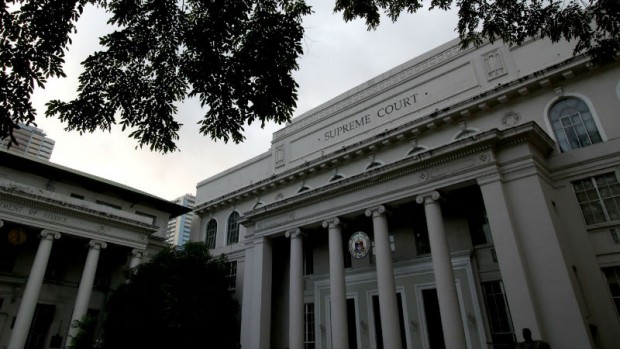THE SUPREME Court has cleared a justice of the Sandiganbayan antigraft court who was accused by a litigant of gross ignorance of the law, manifest partiality and extorting P15 million in exchange for the dismissal of a graft charge.
The accuser, Oriental Mindoro Gov. Pedro Umali, the treasurer of the ruling Liberal Party, was convicted of graft by the Sandiganbayan’s Fourth Division in April 2015 and sentenced up to 10 years in jail with perpetual disqualification from public office.
In a decision dated Feb. 23 and released Monday, the Supreme Court en banc dismissed for lack of merit the administrative complaints that Umali filed in July last year against Fourth Division member Justice Jose Hernandez.
It said Umali had failed to substantiate his allegations.
Lacking in specifics
“Clearly, Umali’s complaint utterly lacked specifics for the court to conclude—based on substantial evidence—that Justice Hernandez demanded P15 million from Umali in exchange for the latter’s acquittal. Umali relied mainly or surmises and conjectures, and on the mere fact that the Sandiganbayan rulings penned by Justice Hernandez were adverse to him,” the high court said in the decision written by Justice Arturo Brion.
“We emphasize that this Court will not shirk from its responsibility of imposing discipline upon erring employees and members of the bench. At the same time, however, the court should not hesitate to shield them from unfounded suits that only serve to disrupt rather than promote the orderly administration of justice. This court will not be the instrument to destroy the reputation of any member of the bench or any of its employees by pronouncing guilt on mere speculation,” the court added.
Umali, with four other persons, was charged with violating the Anti-Graft and Corrupt Practices Act for illegally facilitating a P2.5 million loan, using public funds, to a shipowner in 1994.
The governor claimed that before the April 20, 2015, decision convicting him came out, a cousin of Hernandez’s wife “relayed” to him that he needed to pay P15 million if he wanted to be acquitted. He said he was told it was a one-time “take it or leave it” offer.
Umali also claimed to have gotten the ire of Hernandez after he (Umali) failed to intercede with President Aquino regarding the case confronting Hernandez’s friend, Justice Gregory Ong, who was facing a separate administrative case before the high court.
He said Hernandez also showed partiality during the trial when he asked “numerous loaded questions” to the witnesses and “lawyered” for the prosecution.
Hernandez, in his defense, said Umali’s complaint had no basis, adding that even the extortion claim was lacking in details, such as the date, time and place of the attempt, as well as the names of the person from Umali’s camp approached by the supposed intermediary. The justice also questioned by Umali did not immediately report the alleged extortion to law enforcement authorities and waited three months before filing the complaint.
Hernandez also pointed out that Umali’s conviction was a ruling of a collegial body. He said the governor’s complaint was a collateral attack on the correctness of the division’s decision, which Umali and other accused had elevated to the Supreme Court.
No personal knowledge
Upholding Hernandez, the Supreme Court said Umali failed to prove his allegations by substantial proof.
The justices said it turned out Umali had no personal knowledge of the bribery attempt so his allegation of bribery was mere hearsay.
The governor also failed to provide extrinsic evidence establishing bias, bad faith, malice or corrupt purpose, in addition to a palpable error present in any decision or order Hernandez rendered, that he was being instructed or influenced by Ong.
